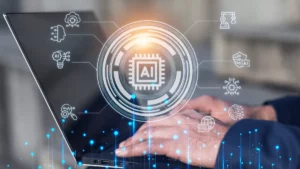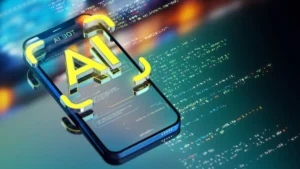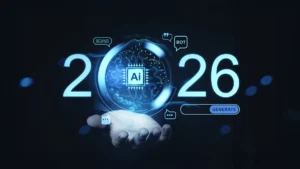In today’s fast-moving tech landscape, one question is sparking curiosity across the world: Are companies using AI to write code? The short answer: Yes, and it’s transforming how software gets built.
Artificial intelligence is no longer just a futuristic concept; it’s now a practical tool that helps developers write, test, and optimize code faster than ever before. From startups to global tech giants, companies are embracing AI coding assistants to increase productivity and accuracy.
AI-driven programming tools such as GitHub Copilot, Amazon CodeWhisperer, and Tabnine are reshaping software development. But to understand how deep this transformation goes, we need to explore why companies are adopting AI for coding, how it works, and what it means for the future of software development.
Why Are Companies Using AI to Write Code?
Companies use AI to write code because it offers speed, precision, and automation. Coding used to require hours of manual effort; now, AI can complete certain tasks in minutes. This shift allows developers to focus on creativity and innovation instead of repetitive syntax.
AI-powered tools analyze large amounts of open-source and proprietary code to predict what developers are trying to build. They can suggest lines, debug functions, and even create full scripts.
Some of the main reasons companies are using AI to write code include:
- Faster Development: AI speeds up coding and testing cycles, allowing businesses to release products sooner.
- Reduced Errors: Intelligent code completion reduces syntax and logic mistakes.
- Lower Costs: Automating repetitive coding tasks saves both time and money.
- Enhanced Productivity: Developers can focus on designing features instead of writing boilerplate code.
- Consistent Quality: AI ensures code quality and compliance with standards.
These benefits make AI an essential tool, not a replacement for human developers, but an assistant that enhances performance.
Which Companies Are Using AI to Write Code?

AI coding is being adopted across industries, from software firms to banks and automotive companies. It’s no longer experimental; many leading organizations rely on AI to improve efficiency, reduce errors, and accelerate development. Let’s look at some real-world examples.
Microsoft
Microsoft uses AI through GitHub Copilot to assist millions of developers worldwide. The tool suggests code snippets, automates repetitive tasks, and helps maintain consistent code quality. Microsoft reports that this approach significantly reduces development time while improving productivity.
Google integrates AI into its internal development tools to automate testing and detect security vulnerabilities early. By leveraging AI, Google engineers can identify potential issues faster and ensure that large-scale systems remain secure and efficient.
Amazon
Amazon employs CodeWhisperer to help engineers generate cloud infrastructure scripts and automate backend processes. This allows developers to focus on complex problem-solving while AI handles routine coding tasks, improving overall workflow efficiency.
Meta (Facebook)
Meta uses AI to review code quality, suggest performance improvements, and optimize existing software. AI helps engineers spot inefficiencies and enhance system performance, enabling faster feature deployment and smoother user experiences.
NVIDIA
NVIDIA relies on AI to optimize complex algorithms, particularly in high-performance computing and graphics processing. AI assists engineers in refining code for speed, accuracy, and resource efficiency, which is critical for cutting-edge applications like AI research and gaming.
IBM
IBM leverages AI to automate bug detection and code testing across its enterprise software solutions. AI tools help ensure reliability, reduce manual labour, and support faster deployment cycles for large-scale corporate applications.
How Does AI Write Code?
AI doesn’t “think” like humans; it learns patterns. Tools like GitHub Copilot and ChatGPT are trained on massive datasets of existing code. When a developer starts typing, AI predicts what line or function should come next, just like autocomplete, but much smarter.
For example, when you write a Python function to calculate averages, AI understands the intent and automatically completes the rest. This process is called machine learning-based code generation, and it’s transforming software creation.
Key Features of AI Coding Systems:
- Code prediction and autocompletion
- Automatic bug detection and debugging
- Natural language to code conversion
- Integration with IDEs like VS Code and JetBrains
- AI-assisted documentation and commenting
These features help developers code with more accuracy and confidence.
Advantages of Using AI to Write Code
AI is transforming software development by improving productivity, accuracy, and collaboration. Companies adopting AI coding tools experience multiple benefits that make their development processes faster, smarter, and more efficient.
Increased Efficiency
AI accelerates coding by automating repetitive tasks and predicting code snippets. Developers can complete more work in less time, focusing on high-level design and problem-solving rather than routine programming.
Reduced Technical Debt
AI helps identify redundant, outdated, or inefficient code. By suggesting improvements and automating refactoring, it reduces technical debt, making long-term maintenance easier and more cost-effective.
Smarter Decision-Making
AI tools analyze code patterns and suggest optimized solutions, helping teams make better technical decisions. This leads to more robust, high-performance applications and fewer runtime errors.
Collaboration Boost
With AI handling repetitive tasks and code reviews, teams can dedicate more time to collaboration and innovation. Developers can brainstorm new features, experiment with designs, and improve overall software quality.
Improved Reliability
By reducing human errors and automating testing, AI ensures that the code is more reliable and predictable. This reliability enhances product stability and builds confidence in deployment cycles.
Challenges Companies Face with AI Coding

While AI offers many advantages, companies still face several challenges when using it for code generation. Human oversight is essential to ensure that the AI-generated code is secure, reliable, and maintainable.
Key Challenges of AI in Coding
- Security Risks: AI models may unintentionally generate insecure code.
- Data Privacy Concerns: Using proprietary datasets in training models raises privacy issues.
- Dependence on AI: Over-reliance may reduce problem-solving skills among new developers.
- Quality Control: Not all AI-generated code is optimized for production environments.
These issues highlight the importance of human oversight in the AI coding process. Developers must review, test, and refine all AI-generated output before deployment.
The Future of AI in Software Development
Looking ahead, the question isn’t “Are companies using AI to write code?” It’s “How much will AI write in the future?” As AI models evolve, we’re moving toward autonomous coding, where AI agents can build entire applications with minimal input.
AI will not replace developers but transform them into AI supervisors guiding, reviewing, and improving what machines create. In the next decade, the collaboration between human intelligence and machine learning will define the next wave of innovation.
Is AI Replacing Human Programmers?
No AI is assisting, not replacing, programmers. Developers bring creativity, logic, and ethical judgment that AI cannot replicate. While AI can handle routine tasks, humans guide the overall design and strategy. The best results occur when humans and AI collaborate effectively.
AI manages repetitive coding, optimization, and code suggestions, allowing developers to focus on architecture, innovation, and problem-solving. This partnership produces faster, more reliable, and higher-quality software. Ultimately, AI enhances human capabilities rather than replacing them. Humans remain in control of software creation.
The Ethical and Security Side of AI Coding

Ethics play a critical role in AI-driven development. Companies must ensure that AI-generated code does not include copyrighted material, introduce bias, or compromise security.
For developers and organizations looking to explore reliable tools while maintaining ethical standards, platforms like OpenAI’s AI development platform provide comprehensive solutions that prioritize responsible AI practices.
Responsible AI Practices
- Verifying code originality
- Using open-source compliant datasets
- Performing human-in-the-loop reviews
- Monitoring for AI bias and errors
This balance of innovation and responsibility is essential for long-term trust in AI-powered systems.
Conclusion
So, are companies using AI to write code? Absolutely, AI is transforming software development by improving speed, accuracy, and efficiency. From startups to tech giants, organizations are leveraging AI to handle repetitive tasks and optimize workflows. However, human oversight remains essential to ensure quality and security.
AI is not replacing developers but empowering them. By handling routine coding, AI allows humans to focus on creativity, architecture, and problem-solving. The future of software development lies in a strong collaboration between human intelligence and AI, combining innovation with efficiency.










